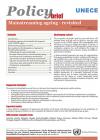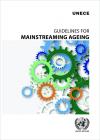Publications
Displaying Results 1 - 6 of 6
- English
The United Nations’ 1994 International Conference on Population and Development (ICPD) in Cairo set a bold new vision of the relationships between population, development and individual rights and well-being. It recognized that population was not about numbers, but about people, and that individual dignity and human rights are the basis for individual well-being and sustainable development.
Ahead
- English
UNECE Policy Brief on Ageing No. 28
At any age, intersecting factors such as poverty, disability, social isolation and exposure to abuse can increase the risk of vulnerability and weaken resilience in the case of adverse events. The COVID-19 pandemic, rising inflation, natural disasters, and war are examples of adverse events that have disproportionately affected vulnerable persons, including
- English
The 2022 UNECE Ministerial Conference on Ageing (Rome, Italy, 16-17 June 2022) concluded the fourth cycle of review and appraisal of the Madrid International Plan of Action on Ageing (MIPAA) and its Regional Implementation Strategy (RIS).
These proceedings provide a summary of the Conference deliberations, as well as a synthesis of the policy progress made between 2017 and 2022 to advance active
- English
The Madrid International Plan of Action on Ageing (MIPAA), adopted at the Second World Assembly on Ageing in April 2002, set a comprehensive and bold agenda for ageing-related policies in the 21st century. With the UNECE Regional Implementation Strategy for MIPAA adopted in Berlin the same year, countries drew a roadmap for creating a society for all ages in the region.
This report, issued to
- English
The population of the UNECE region is ageing: one in four people will be 65 years old or above by 2050 compared to one in six today. Population ageing has social and economic implications for which societies need to prepare. This requires a coordinated, whole-of-government and whole-of-society effort to bring societies and economies into harmony with demographic change, otherwise known as ‘
- English
Mainstreaming ageing is a policy strategy directed towards integrating ageing issues into all relevant policy fields on all levels, which helps to adapt to population ageing and ensure the integration of the needs of all ages groups, including older persons, into the policymaking process.
The Guidelines for Mainstreaming Ageing outline five stages that support countries in establishing a




